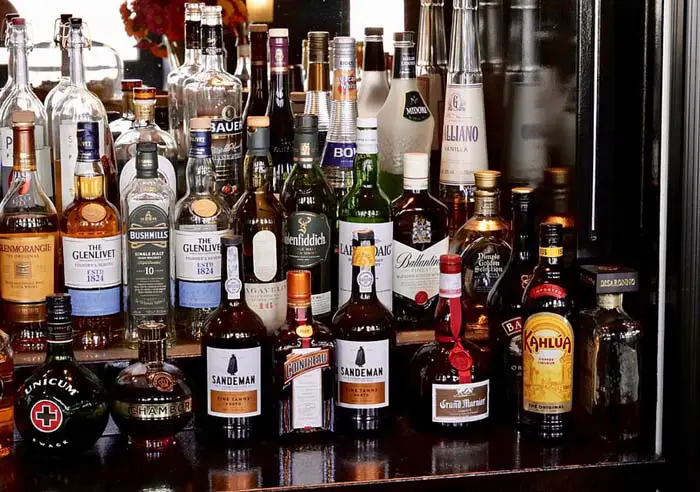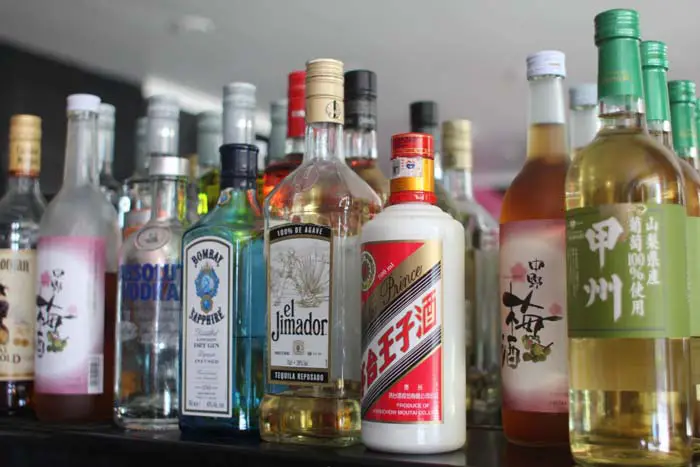Proper storage of alcoholic beverages in your kitchen is essential. It helps to maintain the alcoholic content, flavor, and appearance of your favorite alcoholic beverages, whether you are a host who enjoys having amassed a collection of your favorite alcoholic beverages or having a well-stocked bar for hosting get-togethers.
Alcohol doesn’t go bad, except for wine and a few alcohol brands with added sugar and flavorings, typically made from nuts, herbs, or fruits. However, if the alcohol stays in poor kitchen conditions, it might lose its quality and flavor over time. When storing alcohol, there are additional safety considerations to take into consideration, mainly if there are kids present.
You can store your alcoholic beverages and spirits properly and safely with the help of a nice liquor cabinet. There’s a vast selection of liquor cabinets accessible online for your alcohol storage choices.
With these safety suggestions, you can make sure that your wine and liquor collection is safe and keeps its quality.
Here’s how to store alcoholic beverages in your kitchen.
-
Store away from sunlight
While it might seem like putting your bar essentials on a console by a window may seem elegant, the direct sunshine may ruin the taste or flavor of your beverage. Ultraviolet rays do not affect the amount of alcohol in the liquor, but they lighten the color of dark spirits like whiskey and rum. This will degrade the sweet-smelling compounds and ruin the taste.
Store the bottles away from direct sunlight in an enclosed front liquor cabinet or a corner bar to keep your liquor as flavorful as possible.
-
Storing at room temperature
Common distilled spirits like whiskey, rum, and vodka can oxidize when heated. This results in some of the alcohol evaporating. This could imply that if your alcohol is kept at a high temperature for an extended period of time, your alcohol concentration may be lower than it was.
You should store liqueurs and spirits in the kitchen at 55 to 60 degrees Fahrenheit, just below room temperature. This range prevents oxidation and enables you to fully appreciate the spirit’s range of scents. Except for vermouth, which is a fortified wine, you shouldn’t store alcohol in the refrigerator after opening.
In the opinion of many, vodka is best served ice-cold from the freezer. This can effectively cover up the burning sensation brought on by ethanol in inexpensive, subpar vodkas. However, freezing premium vodka may prevent you from appreciating the complex, delicate taste.
You can keep all your alcohol in a kitchen bar cabinet with a freezer or mini-fridge, which also has space for chilling glasses, ice, and mixers.
-
Make use of a lockable cabinet
Home is where responsible drinking habits are first formed. One of the main reasons why kids get sick is due to alcohol-related poisoning or injuries. To avoid young children accidentally drinking from brightly colored bottles, storing your liquor collection out of reach is crucial. Consider storing them locked if you have kids in the house.
Your alcohol stays out of sight with a lockable bar cabinet. You can find liquor cabinets with an open hutch on top for keeping bar equipment and wine glasses and a locked bottle storage area underneath. Alternatively, select a kitchen cabinet with a full lock. You’ll be able to securely store your collection of premium alcoholic beverages among your special glasses and china.
-
Stand bottles vertically

To reduce the air in the container, a cork is frequently used to seal bottles of premium liquor. These bottles can react with the liquid when kept on their side in a fridge or confined bar cabinet, giving the alcohol a musty smell.
Purchase an alcohol cabinet with a flexible shelf to fit bottles of various sizes. This guarantees you always have space to keep your bottles stocked correctly in your kitchen.
Continuous contact between high-proof alcohol and the cork in horizontal storage might lead to disaster. In contrast to wine, you should not store alcohol on its side. The cork will disintegrate and contaminate your drink if you leave it unattended.
You will have the same issue if you leave the cork to dry out and crack. Keep the bottles upright, but turn the bottles upside down from time to time to re-wet the cork. This will help to keep the wine fresh. You won’t have to worry about unpleasant surprises the next time you have a glass or two!
Alcohol does not go bad; keeping it wrong can make you ill. But it can impact how your favorite alcoholic beverage ages and tastes. Invest in a stylish bar cart or alcohol cabinet to store the alcohol you don’t drink as often.
-
Wall-mounted rack
Another fantastic option is to install a rack on the kitchen wall and place your bottles on it. It will help you to store and show your collection of alcoholic beverages. The best part is that you can get creative with the design! You can choose from a boxed rack, spaced displays, or a horizontal shelf.
-
Drink the last drop
Distillers advise against leaving small amounts of whiskey at the bottom of the bottle. This is because they are more likely to oxidize in case you need another excuse to finish the bottle.
Experts advise consuming alcohol within six months of opening the bottle to maintain the taste. If you have not consumed the entire bottle of a cream-flavored liqueur one year after opening it, you should toss it.
The final few drams of alcohol in the bottle are ideal for making a delectable punch recipe you can serve visitors. If you frequently struggle to finish your bottles, think about purchasing fewer types or smaller liquor bottles.
-
Open kitchen shelves
Even if it would seem like the kitchen is the best location to keep your alcohol in check, how often do you actually consider how you might go about accomplishing so?
Why not make use of open kitchen shelves to keep your liquor bottles on display, giving the room a mini-bar feel? Even if they are half-empty bottles, your visitors will be awe-struck by your collection when they drop by. Just ensure you place the shelves in a cool area, away from the windows or facing the sun.
-
Keep track of the amount of alcohol you have in your home
If you’re hosting a party, it’s easy to forget about the booze you purchased. However, keeping an eye on the number of dangerous substances in your house at all times can keep your children from getting into mischief. Always watch your alcohol cabinet, and ensure you know of any medicine you still have lying about. Knowing that you will notice a lost item right away makes them less likely to do so.
Most families prefer to keep their alcohol locked away. Locks can provide safety and security if parents cannot oversee their older kids while away.
Tips to Prevent Children from Drinking Alcohol Accidentally
-
Never leave a drink alone when you’re out and about
Remember to pick up any unfinished alcoholic beverages you or your visitors leave behind. Before you go to bed, clean any leftover alcohol from a party you had at your place.
-
Keep alcoholic beverages out of the children’s reach
Keep an eye out for anything in your house with alcohol, and store it safely. Items like hand sanitizers, fragrant oils, and perfumes are included in this category.
-
Put it away
Make sure your children cannot get their hands on your alcoholic beverage by locking it up or placing it in a secure location.
-
Have a chat with your child
If possible, you should talk to your kids about how dangerous alcohol is as soon as they are old enough to understand.
Important points
- You should try drinking fruit-based or creamy alcoholic beverages for one year. This is because the alcohol may lose its texture and taste over time.
- If you’re pouring your alcohol out of a bottle, always verify the expiration date.
- Because champagne has a fizz, it’s best to drink it immediately rather than re-cork it and keep it in the fridge.
- After opening and using your wine, re-cork it and put it sideways to keep the air out.
- At a minimum, keep your wine at a temperature of 50°F when not in use.
Conclusion
Whiskey and red wine are two open-bottle beverages. These are best kept at colder temperatures, while other beverages need refrigeration to keep fresh. You can extend the shelf life of your liquor bottles because no alcohol should be wasted due to improper storage. These suggestions will be beneficial if you seek safe ways to keep your alcohol at a liquor store or at home.
When it comes to keeping your collection of alcoholic beverages in storage, quality and safety, come first. Store your favorite alcoholic beverages in a solid, lockable bar kitchen cabinet. This is to ensure they always taste wonderful and are only available to those who are over 21.

